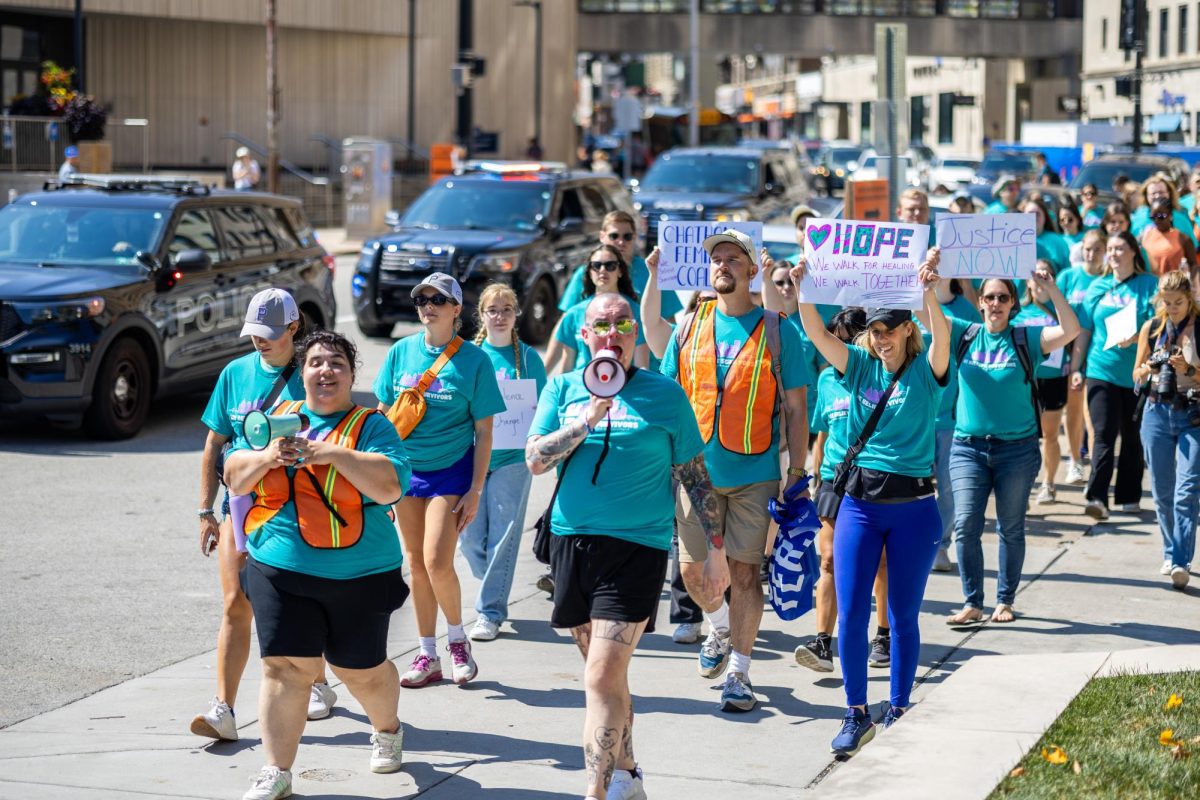“We see you! We hear you! We believe you!” students from local universities chanted as they paraded down Fifth Avenue in solidarity with survivors of sexual violence.
About 50 people gathered on Carnegie Mellon’s Tepper Quad on Sunday morning in teal t-shirts, chanting and holding signs as part of the fourth annual “Pittsburgh Universities Believe Survivors March.” The march ended in front of the William Pitt Union, where organizations like Pittsburgh Action Against Rape (PAAR), Prevention at Pitt, the Women’s Center and Shelter of Greater Pittsburgh and the University counciling center tabled, offering resources for survivors.
Dev Hayostek, the lead prevention educator for Prevention at Pitt, helped to plan the march along with representatives from participating universities.
“It comes together relatively quickly because we all pitch in our resources, and we have our community partners like PAAR and the women’s center and shelter that come to make sure that they can provide their resources for survivors and connect people to the greater community,” Hayostek said.
As they continue to grow the event, Hayostek said Prevention at Pitt is always looking at how they can improve and how they can get more people involved.
“We have recently come together as a group to figure out how we can share resources across universities, recognizing that Pitt often is in a position that has more resources than some of our smaller universities,” Hayostek said. “So how can we continue to change the way we do prevention work and inspire each other to borrow ideas?”
Sarah Durish, a junior early childhood education major at Carlow, is president of the Peer Educator group at Project SAFE. She was introduced to the march by the previous director of Project SAFE as “a good way to help with her healing journey” after experiencing domestic violence.
“I’ve been able to turn such a horrible experience into a beautiful story of hope and healing,” Durish said.
Durish said her experience with Project SAFE allowed her to connect with and help other survivors. She encouraged listeners at the march to ask themselves how they can “support survivors and those currently experiencing these situations.”
“I encourage all of you to advocate, support and respond to those who need it,” Durish said. “These things happen more than we can even begin to understand, and by doing these things, you can help end the cycle.”
The march takes place as Pitt holds a number of events for its first ever Campus Sexual Assault Awareness Month, which falls within the red zone, the period from the beginning of the semester to Thanksgiving break when more than half of sexual assaults among college students occur.
Kelisa Hysenbegasi, a graduate student at Pitt and a prevention educator with Prevention at Pitt, said that Prevention at Pitt hosts events every year while in the red zone trying to “get people engaged.”
“It’s really important for us to create more events surrounding this time,” Hysenbegasi said. “We can talk to people about consent. We can talk to people about bystander intervention. This was one of the many events that we’re trying to have.”
Hysenbagasi also emphasized the ability of the march, and other similar events, to raise awareness and show “community support” for survivors.
“There are people who care,” Hysenbagasi said. “There are people who believe you because so many survivors have experiences where they’re not believed, and that makes it really hard to go forward and get help. It makes it hard to heal.”
PAAR Director of External Affairs and Strategic Leadership Kelsey Leigh spoke to the crowd, sharing resources that her organization offers to college students and community members, including office hours on the 31st of the Cathedral of Learning every Wednesday.
“Our services are confidential and free, and they look like immediate in-person support for someone who has been recently impacted by sexual abuse violence, information about their options and rights, including anonymous reporting connection to our advocacy, counseling services and support groups or information about how to support a survivor in your life,” Leigh said.
Leigh directed listeners to visit PAAR’s table in the William Pitt Union for more information on how to be involved raising awareness for sexual assault, adding “but even if you don’t, know that just by being here right now, you already know how to do the most powerful thing in this movement.”
“Your presence, showing up — this is what matters,” Leigh said.


